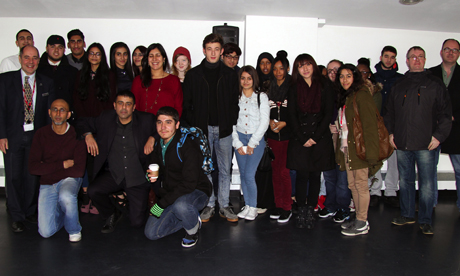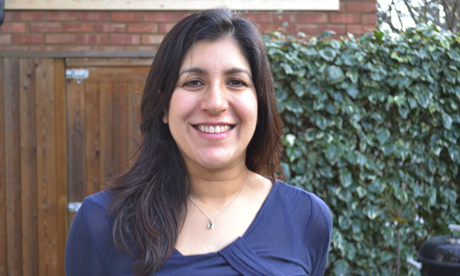Sixth form pupils’ films to improve image of Pakistanis screened at Rich Mix

Movie makers: students and teachers from Luton, Leyton and New Vic sixth form colleges
Osama bin Laden, sectarian violence and natural disasters are prominent in most people’s image of Pakistan, but a Hackney resident is determined to change this with help from East London school pupils.
Solicitor Shazia Ali-Webber, who lives in Sharon Gardens, Victoria Park, helped sixth formers of Pakistani origin make short films about their lives.
The fruits of their efforts were screened at Rich Mix in Shoreditch last month to an audience that included a film critic from The Independent.
A quarter of a million people fly between Britain and Pakistan each year, but, because it is hardly viewed as a tourist destination, it is viewed far less rosily than its neighbour India.
“Pakistan is mostly portrayed as a hornets’ nest full of tyrannical men with beards,” says Ms Ali-Webber, “and the country’s image itself touches on British Pakistanis. The truth is a lot more complicated.”
The ‘Land of the Pure’, founded as a secular Muslim democracy by Muhammad Ali Jinnah during the break-up of the British Empire, is a place of fascinating contradictions. Women have been a driving force in its politics and society. Benazir Bhutto served as prime minister and Jinnah’s sister Fatima played a key role in the nation’s creation – not to mention Malala Yousafzai, the teenage Pakistani school pupil and education campaigner who became an international icon after she survived being shot by the Taliban.
“I was listening to a radio programme about being gay in Pakistan and the interviewer was talking to a gay man who said it is a wonderfully liberating place in which to be gay,” says Ms Ali-Webber. “Because of the sufi tradition there are shrines visited by gay men at night, and because they are sanctified places the police don’t take action.”
Cities like Karachi have shiny shopping malls, and materialistic rich folk to rival any in the West.
As for British Pakistanis, there is still prejudice against them. Ms Ali-Webber cites recent remarks by Attorney General Dominic Grieve in which he appeared to suggest corruption was endemic in the community.
“In the media there is a lot of coverage of criminal behaviour such as the sex gangs in Rochdale, corruption and vote rigging,” she adds. “You don’t often hear about the contribution made by the community. For example there is the Bestway Group, which is based here in Hackney, and is one of the most successful ventures in this area. It is a massive commercial operation run by Pakistanis.
“There is an enormous level of energy and commitment and passion in British Pakistanis. When there were floods in Pakistan, British Pakistanis organised to fly over there themselves to deliver supplies because they did not trust organisations to do it.
“I’ve been to Pakistan four times, and the longest I stayed was five months, but I am British. My whole life is here. My kids are here. And yet that country still tugs at me.
“As much as this project with sixth formers is intended to broaden the image of Pakistan in the mainstream, it is also about establishing more formal channels through which to contribute to that country.”

Shazia Ali-Webber. Photograph: Josh Loeb
Ms Ali-Webber worked with media studies pupils from sixth-form colleges in Leyton, Newham and Luton, and the films provided surprising insights.
She says: “One of the films showed four girls with headscarves and four girls without headscarves, with an interviewer off camera asking them questions such as ‘Would you marry for love or because of what your parents want?’
“The answers weren’t at all predictable. Even I thought the girls who wore the hijab would be more likely to say, oh yes, I would definitely marry according to my parents’ wishes, but in fact it was the opposite. The group that was most conformist was the group that didn’t show any ostensible signs of being religious.”
Ms Ali-Webber now hopes to arrange screenings of the films at the Southbank Centre as part of the Alchemy Festival later this year.
